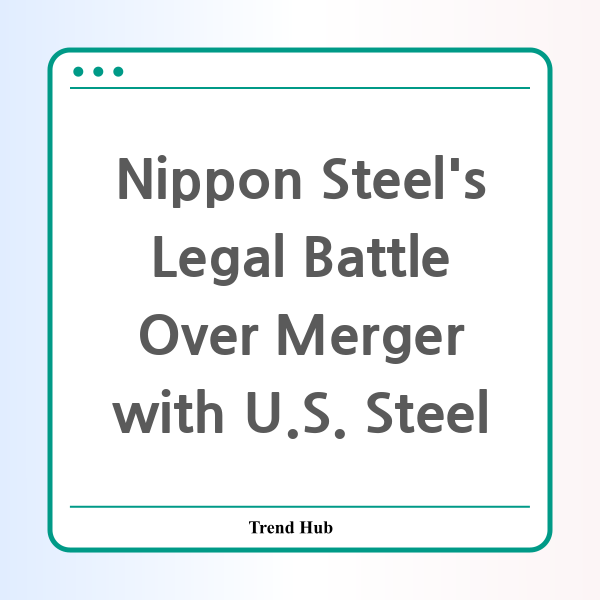* This website participates in the Amazon Affiliate Program and earns from qualifying purchases.

What happens when a major merger attempt faces overwhelming political and legal hurdles? The recent legal actions by Nippon Steel and U.S. Steel provide a striking illustration of this scenario, revealing the complexities of corporate mergers in today's politically charged environment.
In a surprising move, Nippon Steel and U.S. Steel have filed lawsuits against President Biden, claiming that his decision to block their $14.9 billion merger was not just a blow to their corporate ambitions, but also a violation of their constitutional rights. The lawsuits allege that the Biden administration manipulated the review process for political gain, jeopardizing both the companies and the jobs of steel workers across America.
At the heart of these legal disputes is the assertion that the merger posed no genuine threat to national security, contradicting the administration's justification for its blockade. Nippon Steel and U.S. Steel argue that the merger would actually strengthen the American steel industry by enhancing competitiveness against international rivals.
The Biden administration has emphasized its commitment to a robust domestic steel market, suggesting that allowing foreign ownership would undermine U.S. production capabilities. The Committee on Foreign Investment in the United States (CFIUS) determined that the acquisition could harm American interests. However, this stance has been met with skepticism from the companies, which have described the government’s actions as a tactic to win favor with the United Steelworkers union, a powerful political ally.
The lawsuits also extend to Cleveland-Cliffs, another American steel company, and its executives. U.S. Steel and Nippon Steel allege that Cleveland-Cliffs engaged in illegal collusion to undermine their merger, thereby attempting to monopolize the domestic steel market. They claim this was executed through a campaign of public disinformation and obstruction, which is depicted as a coordinated effort to sway the political landscape in Cleveland-Cliffs' favor.
The intricacies of these legal battles illustrate the challenges that foreign investments in U.S. industries face, especially in sectors deemed vital for national security. Both companies are seeking expedited reviews in hopes of reviving their merger plans. They have also requested the court to provide them with communications between the Biden administration and executives from Cleveland-Cliffs, aiming to uncover what they allege are politically motivated decisions.
This case highlights the growing intersection of business and politics in America. Merger negotiations, particularly those involving foreign entities, increasingly find themselves caught in the web of political allegiances and national policy. As the lawsuits proceed, they will not only test the boundaries of regulatory authority over foreign investments but will also further embroil the steel industry in a contentious political atmosphere.
As Nippon Steel and U.S. Steel navigate this challenging landscape, their journey underscores a crucial point: corporate mergers in the realm of national security are fraught with complications and repercussions that extend far beyond the boardroom.
* This website participates in the Amazon Affiliate Program and earns from qualifying purchases.